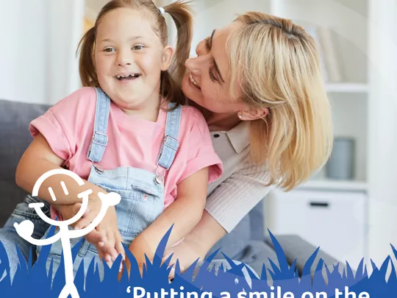Disability fostering involves looking after a child with a disability, which could be physical, mental or a child with health needs.
‘Don’t underestimate yourself. Be willing to give disabled children a chance – you will learn a lot from it and will reap the rewards!’ – Foster parent
What is disability fostering?
Do you have patience, understanding and willingness to learn? Then you have the skills we are looking for to foster a disabled child or young person. We offer a full disability service supported by specialist disability social workers.
Could you foster a disabled child?
At Fostering People, we’ve been changing lives since 2000. Over that time, we have cared for many disabled children with many different needs.
If you have patience, understanding, a good sense of humour, can be extra vigilant with safety, be open-minded, good at communicating, able to advocate and to learn and be committed to meeting disabled children’s needs, then you have the skills we are looking for.
As a foster parent for disabled children, you will be offering specialist care to children who may have autism, learning difficulties, physical disabilities or medical conditions.
Finding a great foster family that meets the needs of a child can be challenging but, for a disabled child, the challenge is often greater. At Fostering People, you don’t need to choose between fostering children with or without a disability, but be open to considering any child according to your own skills and experience.
Becoming a foster parent for disabled children can seem quite daunting, but don’t worry – here at Fostering People, you would be supported by a specialist disability social worker who has significant experience of working with disabled children. We will provide training, advice and specialist support groups, to ensure that every disabled child is able to achieve to their fullest potential.
Types of disability fostering
There is a growing need for foster parents to look after disabled children and young people, and we have extended our disability services because of this increasing demand that local authorities across the UK face in finding appropriate, safe foster homes for disabled children.
Here at Fostering People, we offer a range of placements to disabled children and these include:
- Long term fostering placements.
- Short term fostering placements.
- Respite fostering placements.
- Short break schemes.
- Support to disabled young people through transition to adulthood.

Short Breaks
Fostering People currently work with Birmingham City Council to provide short break foster placements for disabled children.
These children are not in foster care and live at home with their families, however, specialist Fostering People foster parents provide the families with much-needed support by looking after these children and young people for short periods of time.
The children having short breaks with us often have complex medical needs or have more profound physical disabilities. Therefore, the breaks we provide enable parents to allow for one to one time with other siblings and time to rest.
Training to be a disability foster parent
As you’d expect from an Ofsted outstanding and Care Inspectorate excellent fostering agency, we provide bespoke and specific training for all of our families working with our disabled children.
As Josh’s story shows, we will ensure that our foster families are fully trained and supported to care for an individual child’s needs.
When it comes to disability, the needs of children are extremely varied. Our full training programme will equip you to care for a child with most learning disabilities and mild health concerns. If a child has more complex needs, we will ensure you are fully trained and supported before a child comes to live with you.
A Foster Parent’s Guide to Disability & Mental Health
Download our free guide to discover the best ways to support and care for foster children with physical and learning disabilities, serious medical conditions and mental health disorders.

Disability Myths
Some people find the idea of caring for a child with a disability overwhelming. But our experience has shown that there are a lot of myths when it comes to fostering a child with more complex needs, below we have highlighted some of the most common.
Myth 1: Children with disabilities have physical needs and use a wheelchair
Not all children with disabilities will have physical needs or require home adaptations and not all disabilities are visible. Disabilities vary and can include; Autism, Learning Disabilities, Visual Impairments, Deaf or Hard of Hearing and Acquired Brain Injury.
Myth 2: I need to be a qualified nurse to care for a child with complex health needs.
You don’t need to be medically qualified, or have previous medical experience to look after a child with complex health needs. All training will be provided; for us, it’s about learning and development. If you are willing to learn, you can foster a child that has more complex health needs.
Myth 3: I can’t become a foster parent if my child has a disability
You can still foster even if your own child has a disability. It’s about careful consideration of the impact of fostering on your child. As a parent of a disabled child, you would have invaluable skills and experience to bring to the role.
Myth 4: I can’t foster as I have a disability
You can foster if you have a disability. There are expectations within fostering regarding your health to ensure that fostering wouldn’t have a negative impact on you or your health, but this is the same for everyone applying to foster.
Myth 5: Autism is caused by bad parenting
Autism is not caused by bad parenting. There are still ongoing studies and research being carried out as to the cause of Autism, however the hypothesis of ‘bad’ or ‘poor’ parenting has been disproved.
Myth 6: Children with Autism can’t communicate
Children with Autism can communicate and this will be in their own way. Some children with autism have good verbal communication and can communicate their wishes and feelings well. Others will have limited vocabulary but use non-verbal cues such as signs, gestures, pictures and body language to aid their communication. This can seem a lot less daunting when you consider that over 70% of all human communication is non-verbal.
Myth 7: Children with Autism do not show affection or eye contact.
Whilst these are recognised as being some of the traits, it’s not necessarily true of all children with Autism. Some do give eye contact, although this may differ to other children. Children with Autism may be oversensitive to touch and hugs, however may show affection in other ways that are individual to them.
Myth 8: ADHD is an excuse for challenging behaviour
ADHD is a real medical condition and is not used as a label for ‘challenging behaviour’.
Take your first step to becoming a foster parent today
If you’re interested in becoming a foster parent and would like to learn more, then we’d love to hear from you.
Simply fill in the form below and one of our friendly team will be in touch.
Enquiry
Please make sure you read our terms and conditions because you’re agreeing to them by submitting an enquiry. It’s also worth reading our privacy notice and cookies policy so you understand how we collect and use your personal data. This site is protected by reCAPTCHA and the Google Privacy Policy and Terms of Service apply.
Can’t find what you’re looking for?
By Phone
Visit an office
Suite D, The Point,
Welbeck Road, West Bridgford,
Nottingham, NG2 7QW





